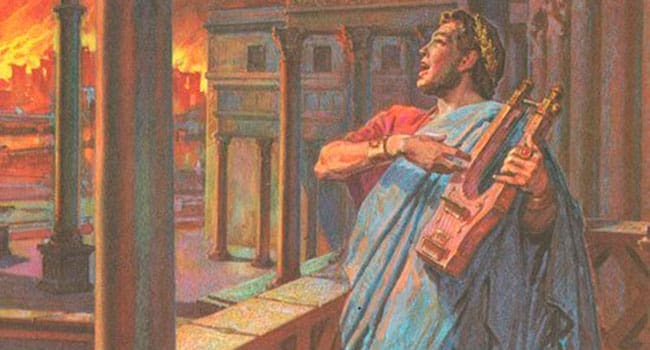 The decline of the U.S. and the rapid erosion of its moral authority have, under Donald Trump, reached the breaking point. Either Americans change course to renew and restore their republic, or they will continue the slide into tyranny and ruin.
The decline of the U.S. and the rapid erosion of its moral authority have, under Donald Trump, reached the breaking point. Either Americans change course to renew and restore their republic, or they will continue the slide into tyranny and ruin.
But… many say, hold on now, surely the U.S. Constitution preserves the values and institutions of American democracy.
Regrettably that’s not the case: constitutions are just so many words on paper. A fabric of shared values and collective ethical standards underpins republics like the United States. Regrettably, these virtues are unraveling like a cheap carpet in 21st century America.
How does a democratic republic collapse into despotism and ruin?
Ancient Rome is the classic example and, given the shocking parallels, it’s more than relevant to our modern world.
Most of us are familiar with the Roman Empire. It’s been portrayed in movies and schoolbooks as a decadent, power-hungry state led by psychopathic emperors like Nero and Caligula.
That, however, is only part of the story. Rome began as an idealistic republic with a history that’s not dissimilar to the early American republic.
In its earliest days, Rome was a smallish city-state with a typical monarchial social structure. But then something quite remarkable happened; the desire for democracy and individual rights began to unravel this hierarchical system.
The last Roman king, Tarquinius Superbus, was expelled from Rome in 510 BC. After the king departed republican, Rome (like the early American republic) implemented reforms, replacing the centralized kingly power with institutions that affected a division of the sovereign authority into democratic form with relatively effective checks and balances.
The early Roman republic, like the United States, had no standing army, a solid system of civil law and workable democratic institutions, including – in Rome’s case – veto-wielding Tribunes representing the common people.
Contrary to popular belief, Rome did not start out as an aggressive military power. In the words of Tenney Frank, the early 20th century professor of Latin at Bryn Mawr College, “… imagine an agricultural people, not too thickly settled and not egged on by commercial ambitions… a democratic republic in which the citizens must vote whether or not to proclaim a war and in voting affirmatively must not only impose upon themselves an additional war tax but must also run from the voting booths to the recruiting station and (personally) enroll in the legions.
Like the United States, republican Rome became an imperial power somewhat reluctantly. Frank: “… what explains the apparent paradox that Rome became mistress of the whole world while adhering with a fair degree of fidelity to a sacred rule which forbade wars of aggression.”
It’s all eerily similar to America’s role in the post-War world where, in the desire to contain Soviet Communism the U.S, (with full public denial), fought wars of aggression in Korea, Vietnam and Central America, overthrowing democratically elected governments in Iran and other small states.
The Roman slide into empire and ruin was paralleled by a steady erosion of stoic republican virtues, including the mutual respect, shared values and moral restraint that had characterized the early republic. The intense infighting and political tribalism that’s crippling the U.S. Congress today is a modern symptom of the same disease.
Sadly, the Roman republic died of neglect. Frank: “The free Roman public stumbled on falteringly and unwittingly into ever increasing dominion until finally the overgrown empire imposed a burden upon the republic that levelled the whole state into a condition of servitude.”
Republics can only sustain themselves if there is an essential equality of citizens. Like today, there were ancient Romans who saw the growing inequality and tried to stop it. The Gracchus brothers, for instance, tried to implement agricultural reforms to re-create the state in its original condition of land owning owner-citizens. Regrettably, they failed, and the imperial exploitation continued unabated, corrupting the ethical foundations of Rome, leading to civil war and the ruin of the republic.
Republics don’t happen by accident; they’re acts of will. And like my father-in-law Jack Bromley used to say, “civilization is but a thin veneer; democracy needs protecting.”
There are points of no return in the life of a nation, and the Presidency of Donald Trump is one of them. Trump’s callous disregard for both the letter and spirit of the U.S. Constitution should be a red flag for Americans and the world. The collapse of Ancient Rome sent the Western world into centuries of darkness. Let’s make sure it doesn’t happen again.
Robert McGarvey is an economic historian and former managing director of Merlin Consulting, a London, U.K.-based consulting firm. Robert’s most recent book is Futuromics: A Guide to Thriving in Capitalism’s Third Wave.
Robert is a Troy Media contributor. Why aren’t you?
The views, opinions and positions expressed by columnists and contributors are the author’s alone. They do not inherently or expressly reflect the views, opinions and/or positions of our publication.


